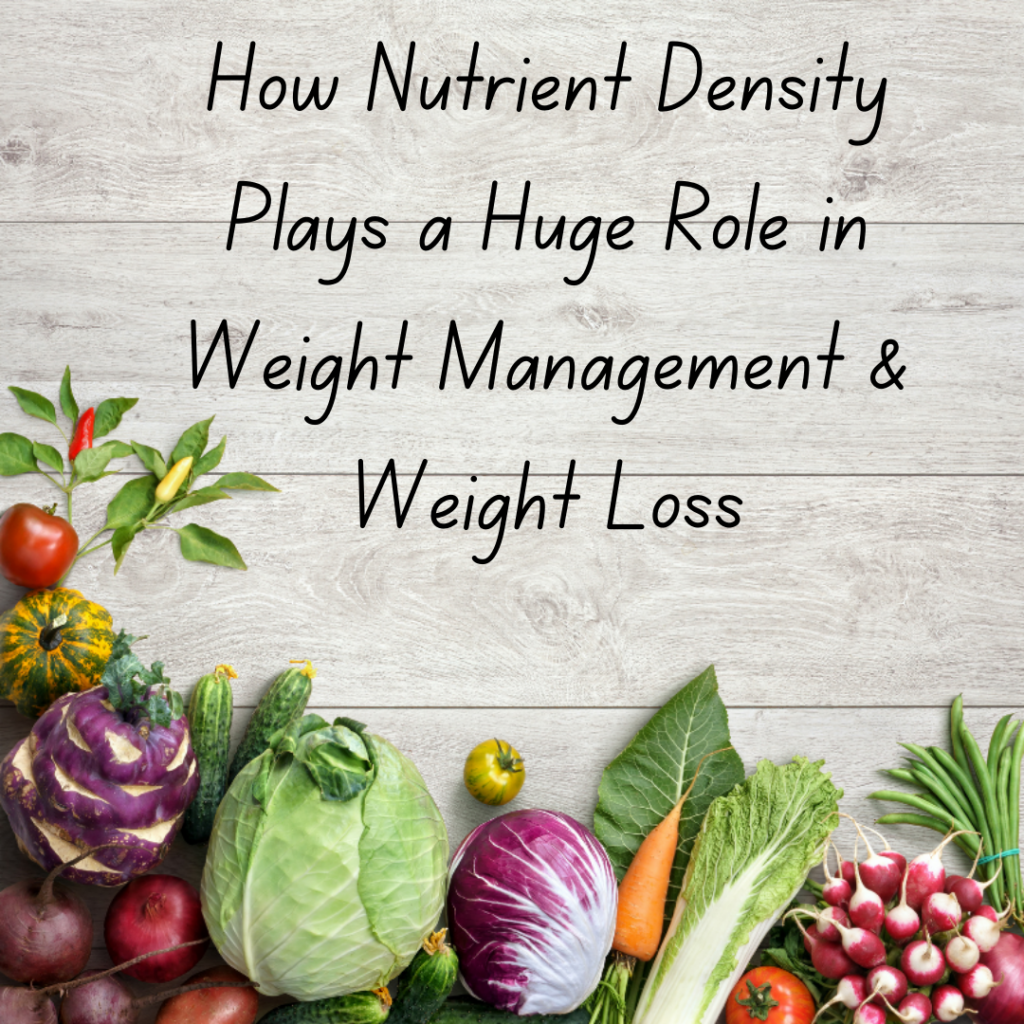
When it comes to health and weight loss, you may be focusing on one specific aspect to help promote and aid that weight loss. Whether it be calorie counting or macro counting, everyone’s body is different and may react differently to different aids of weight loss.
However, have you thought about nutrient density?
According to the National Institutes of Health and the U.S. Department of Health & Human Services, “nutrient-dense foods” are those that provide a high amount nutrients and have relatively few calories.” These foods ultimately contributing to satiety and weight loss.
What’s the difference between nutrient-dense food and non-nutrient-dense food?
Here’s an example: let’s compare one slice of white bread and one slice of whole-grain bread. The one slice of white bread has only 70 calories and very little nutrients, but the whole-grain bread contains the same number of calories but four times the amount of nutrients like potassium and magnesium, and three times the zinc.
Which would you choose to benefit your health the most? I know what I’d pick!
The Weight Loss Connection
Unfortunately, as the American Heart Association puts it, “the standard American diet (SAD) is energy-rich and nutrient-poor.”
A diet that includes nutrient-dense foods can lead to weight loss since this approach cuts out empty calories from things like added sugar, processed grains and refined oils. In addition to preventing nutrient deficiencies, eating more whole foods is beneficial for maintaining a healthy weight.
When you choose foods that pack fewer calories into each bite, you naturally lower the overall calories of your diet. You get all the essential vitamins and minerals you need without feeling hungry or deprived, and this also prevents over-consuming calories that can lead to weight gain.
Another big advantage to following a nutrient-dense diet, is that you can maintain a healthy weight without cutting out any particular foods or food groups, you don’t have to follow any fad diets or count calories. It’s much easier to eat an appropriate amount of calories, when you simply reduce or remove processed foods from your diet that are high in sugar, chemicals, sodium and additives. In addition, because nutrient-dense foods are low in calories (they tend to have lots of fiber, water and no additives), you may be able to actually eat MORE food and maintain or even lose weight. Healthy foods like veggies, fruits, and in moderation legumes/beans or whole grains are very voluminous and filling.
Why Are Nutrient-Dense Foods Important?
Whole foods provides with essential vitamins, minerals, amino acids (that form protein), fatty acids, and more. In a way a nutrient-dense diet could be described is as an anti-inflammatory diet, which we know is important for preventing chronic diseases and risk factors like heart disease, high blood pressure, diabetes and obesity.
Here’s another way to look at it: In terms of the amount of nutrients you’d get per calorie consumed, 500 calories worth of fast food is obviously NOT the same as 600 calories of whole food.
Dr. Fuhrman has a “Nutrient Density Scale.” On this scale oatmeal has a score of 53. You would have to eat four bowls of oatmeal to equal the nutrient density of just one bowl of strawberries. And you’d have to eat about 20 bowls of oatmeal to get the equivalent nutrients of one bowl of kale!
How can I add these foods into my diet?
It’s normal to feel a bit overwhelmed by a diet change, especially if you don’t eat this way to begin with. The bottom line is, you can gradually make these changes and see some very satisfying and beneficial results. This is about addition not restriction!
It won’t happen overnight (and shouldn’t happen overnight either – for instance, adding too much fiber too fast can cause gas and bloating!
You’ll want to look for foods that are rich in vitamins, minerals, complex carbohydrates (because carbs AREN’T bad), lean protein, and healthy fats. This all plays a vital role not just in outer health AND internal health, too. You can rest assured that consuming more nutrient-dense foods will have some of the best effects on your health and become a fantastic weight aid.
What foods are most nutrient-dense?
Based on the amount of nutrients in proportion to the amount of calories that these foods have, here are the some of the most nutrient-dense foods available to us:
- Seaweed
- Leafy greens, like kale, collards, spinach, watercress, dandelion greens & arugula
- Broccoli rabe, broccoli, cauliflower and other cruciferous veggies like cabbage or Brussels sprouts
- Exotic berries like acai, goji and camu camu
- Red, yellow, green and orange bell peppers
- Carrots and parsnips
- Garlic
- Parsley, cilantro, basil and other herbs
- Berries (blueberries, raspberries, blackberries)
- Asparagus
- Beets
- Wild salmon and sardines
- Green beans
- Egg yolks
- Pumpkin
- Lentils
- Artichokes
- Tomatoes
- Wild mushrooms
- Seeds: pumpkin, sunflower, chia & flax
- Sweet potatoes
- Black beans
- Wild rice
- Cacao
Thanks for reading……
Please Join My free Facebook group